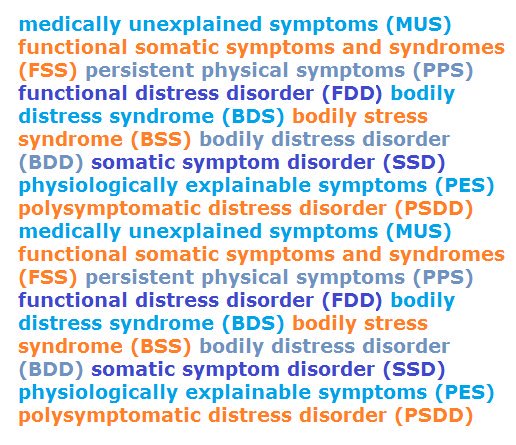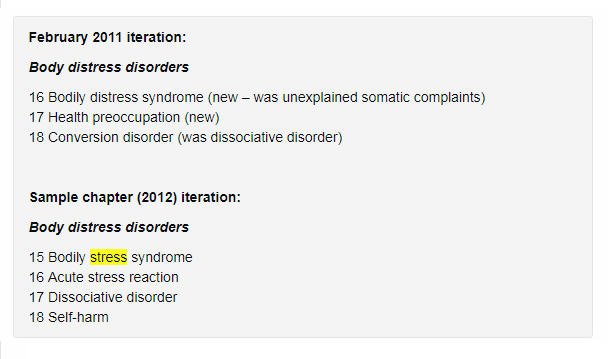The
ICD-10 PHC (or "primary care edition") of ICD-10 was for mental disorders only.
Rather than include several hundred ICD-10 core version mental disorders, it contains 26 of what were considered the most common mental disorders encountered in general practice and for use in some countries by, for example, clinically untrained staff, for teaching purposes and in low to medium resource countries where the use of the core ICD-10 publication wasn't practical.
The publication included disorder descriptions and guidance. Training packs were also produced with disorder cards and diagnosis and management guidance.
These are the 26 disorders included in the ICD-10 PHC.
The category,
F45 Unexplained somatic complaints was later referred to as
F45 Medically unexplained symptoms and was the corresponding term for the
F45 Somatoform disorders block in Chapter V
Mental and behavioural disorders chapter in the core ICD-10.
As you see in this table, the F45 and F48
Neurasthenia category are not being included in the revision for ICD-11 PHC.
These two categories are proposed by the external PCCG primary care advisory group to be replaced with the group's proposed "Bodily stress syndrome" category, which has been adapted from the Fink et al (2010) Bodily distress syndrome (BSD) construct.
Categories included in the primary care edition require a corresponding category (or category block) in the core version.
But the situation we have with the PCCG is that the group has been pushing since 2011 for a construct adapted from Fink et al (2010) BDS, whereas the separate work group for the core ICD-11, that is making recommendations for the revision of the ICD-10
F45 Somatoform disorders and
F48.0 Neurasthenia, has proposed a new single disorder category that is closely aligned with DSM-5's
Somatic symptom disorder (SSD).
So there is a lack of correspondence between the two sets of proposals and the two groups have not worked collaboratively and rarely has the work of one group been discussed by the other group.
(I've set this out several times before on other platforms, so bear with me, those of you who have heard it all before.)
For the next edition, ICD-11 PHC, 28 disorders are proposed to be included. And again, this edition will contain only mental disorder categories - no other abridged ICD chapters are included.
These 28 categories are proposed to be arranged in disorder groupings and the section names for the disorder groups and for the category terms that sit underneath them have undergone several iterations since 2011:
As you see from this image from a 2015 report on my site, initially the proposed replacement term for the category, "Unexplained somatic complaints/MUS" had been, 16 Bodily distress syndrome, under disorder group
"Body distress disorders".
This was later revised to 15 Bodily
stress syndrome - which is the term that is currently being recommended by the external work group.
(Note that other terms in the list may have also been revised since this 2012 list above was first published.)
The ICD-11 core version's BDD has already been added to SNOMED CT (in July 2017) as an exact match for ICD-11's BDD concept, to which it will be mapped in the cross terminology code mapping tool.
So we have the situation where for the core version of ICD-11, the Somatoform disorder categories are proposed to be replaced with a single construct, BDD, adapted from DSM-5's SSD, and SSD is listed under Synonyms.
But the primary care group persists with recommending a "Bodily stress syndrome" term, which has been adapted from the Fink et al (2010) Bodily distress syndrome criteria set and it keeps tweaking the proposed criteria.
If you were to range them left to right on a continuum, based on construct conceptualization and alignment of criteria, it would range like this:
<----------Fink "pure" BDS-------------------------------------------------------------------------------------DSM-5 "pure" SSD---------->
BDS (Fink, 2010) BSS (ICD-11 primary care group) BSS (alternative criteria set) ------------BDD (ICD-11 core version) SSD (DSM-5)




